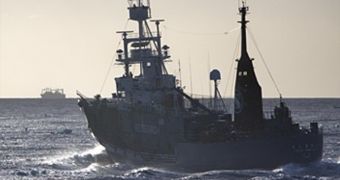Activists from the Sea Shepherd environmental anti-whaling group are under intense pressure from the Japanese whaling fleet to discontinue their bid to stop them, Paul Watson, the leader of the group and the captain of its flagship, the Steve Irwin, says. He reveals that his ship managed to catch up with the whalers more than a month after the chase was discontinued. The Steve Irwin had to drop out of the race more than one month ago, in order to sail back to the state-island of Tasmania and refuel. Watson maintains that the whaling fleet uses acoustic weapons and lead weights to prevent the activists from interfering with their operation.
Under the 1982 UN Charter, commercial whaling is strictly prohibited throughout the world, yet Japan exploits a loophole in this agreement, and still conducts a yearly cull of over 1,000 whales under the claim that it is engaged in a scientific research. However, representatives of Sea Shepherd argue that the actions are illegal, and have taken it upon themselves to interfere with them. Over the last years, this group has constantly disrupted Japanese operations in the treacherous waters of the Arctic, sometimes alongside Greenpeace, which has decided to focus its effort in Japan this year, and has not sent a ship to sea.
Earlier today, Watson announced that the Steve Irwin and its crew were subjected to attacks from one or more acoustic devices, which generated mid and high frequencies. These sounds have the ability to incapacitate people, and even cause serious injuries. Long Range Acoustical Devices (LRAD) are strictly prohibited in the Antarctic Treaty Zone, under international law, and the fact that the Japanese have them is just another violation of the rule of law.
Also, Paul Watson comments that sailors from the fleet have also thrown lead weights on the group's inflatable boats, in an attempt to render them useless for protests. “We are 7 miles from the fleet and approaching. We see the Nisshin Maru and two harpoon vessels the Yushin Maru #1 and the Yushin Maru #2. They appear to be whaling and are not moving. If we don’t catch up with them before they begin to move, we are close enough now that we will not lose the Nisshin Maru,” he continues.
In addition, one crew member aboard the Steve Irwin has been reportedly injured by a water canon, fired from one of the Japanese ships. This type of aggression in the extremely dangerous waters of the Antarctic can have serious repercussions for both parties involved. The whaling fleet has even lost one of its members, a sailor that fell overboard some weeks ago. Sea Shepherd volunteered to put the quarrel aside and help save him, but the Japanese refused and sailed further away.

 14 DAY TRIAL //
14 DAY TRIAL //